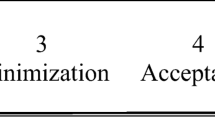Abstract
Higher education institutions face the challenge to promote diversity competence. We suggest a procedure which can help raise awareness for diversity issues amongst staff and students and thereby foster diversity competence and facilitate the implementation of diversity strategies within higher education institutions: to include a self-assessment tool regarding diversity competence in the regular teaching evaluation. In this research we complemented a well-established course evaluation tool that is widely used in Germany, the HEsaCom, by a new subscale measuring subjective gains in diversity competence. As part of regular teaching evaluations, 8700 questionnaires comprising the HEsaCom-scales and the new scale on diversity competence were collected in 1396 different seminars of a large university in Germany. Results show good reliabilities for all scales. From factor analysis, the new scale emerged as an additional subscale of the HEsaCom, with the established factor structure remaining unchanged. Students attending a cross-study course in which diversity had been a topic and students attending courses in which no participant had experienced social discrimination reported significantly higher diversity competence gains than students from the remaining courses. We discuss how higher education institutions can apply the questionnaire used in our study for their diversity management.

Similar content being viewed by others
References
Alizadeh, S., & Chavan, M. (2016). Cultural competence dimensions and outcomes: A systematic review of the literature. Health and Social Care in the Community, 24, e117–e130. https://doi.org/10.1111/hsc.12293 .
Altemeyer, B. (1981). Right-wing authoritarianism. Winnipeg, CA: University of Manitoba Press.
Apfelbaum, E., Pauker, K., Sommers, S., & Ambady, N. (2010). In blind pursuit of racial equality? Psychological Science, 21, 1587–1592. https://doi.org/10.1177/0956797610384741 .
Biggs, J. B., & Tang, C. (2011). Teaching for quality learning at university: What the student does (4th ed.). Maidenhead: Open University Press/McGraw-Hill Education. https://doi.org/10.1111/teth.12173 .
Braun, E., & Leidner, B. (2009). Academic course evaluation: Theoretical and empirical distinctions between self-rated gain in competences and satisfaction with teaching behavior. European Psychologist, 14, 297–306. https://doi.org/10.1027/1016-9040.14.4.297 .
Braun, E., Gusy, B., Leidner, B., & Hannover, B. (2008). Kompetenzorientierte Lehrevaluation. Das Berliner Evaluationsinstrument für selbst eingeschätzte, studentische Kompetenzen (BEvaKomp). [Competence oriented teaching evaluations. The “Evaluation in Higher Education: Self-Assessed Competences” questionnaire (HEsaCom)]. Diagnostica, 1, 30–43.
Chun, E., & Evans, A. (2016). Rethinking cultural competence in higher education: An ecological framework for student development. ASHE Higher Education Report, 42, 7–162. https://doi.org/10.1002/aehe.20102 .
Crews, T., & Curtis, D. (2011). Online course evaluations: Faculty perspective and strategies for improved response rates. Assessment and Evaluation in Higher Education, 36, 865–878. https://doi.org/10.1080/02602938.2010.493970 .
Dass, P., & Parker, B. (1999). Strategies for managing human resource diversity: From resistance to learning. Academy of Management Executive, 13, 68–80. https://doi.org/10.5465/AME.1999.1899550 .
De Ridder, D., & Jorzik, B. (2012). Vielfalt gestalten. Kernelemente eines Diversity-Audits für Hochschulen. Positionen des Stifterverbands für die deutsche Wissenschaft [Shaping plurality. Key elements of an audit of diversity at universities. Positions of the Association for the Promotion of Science and Humanities in Germany]. Essen: Edition Stifterverband-Verwaltungsgesellschaft für Wissenschaftspflege mbH.
Dollhausen, K., Wolter, A., Banscherus, U., Geffers, J., Lattke, S., Scheliga, F., & Spexard, A. (2013). Opening higher education to adults. Final report. Brussels: European Commission.
Graziano, K. J., & Navarrete, L. A. (2012). Co-teaching in a teacher education classroom: Collaboration, compromise, and creativity. Issues in Teacher Education, 21(1), 109–126.
Hachfeld, A., Hahn, A., Schroeder, S., Anders, Y., & Kunter, M. (2015). Should teachers be colorblind? How multicultural and egalitarian beliefs differentially relate to aspects of teachers' professional competence for teaching in diverse classrooms. Teaching and Teacher Education, 48, 44–55. https://doi.org/10.1016/j.tate.2015.02.001 .
Hauschildt, K., Gwosć, C., Netz, N., & Mishra, S. (2015). Social and economic conditions of student life in Europe. Synopsis of indicators. EUROSTUDENT V 2012–2015. Bielefeld: W. Bertelsmann.
Klammer, U., & Matuko, B. J. (2010). Diversity Management als Zukunftsaufgabe der Hochschulen – Ausgangsbedingungen und Ansatzpunkte [Diversity management as a future task of universities-basic conditions and starting points]. Der pädagogische Blick, 18, 106–118.
Murray, N. (2016). Dealing with diversity in higher education: Awareness raising and a linguistic perspective on teachers' intercultural competence. International Journal for Academic Development, 21, 166–177. https://doi.org/10.1080/1360144X.2015.1094660 .
Norton, R. (1975). Measurement of ambiguity tolerance. Journal of Personality Assessment, 39, 607–619.
Nulty, D. (2008). The adequacy of response rates to online and paper surveys: What can be done? Assessment and Evaluation in Higher Education, 33, 301–314. https://doi.org/10.1080/02602930701293231 .
Otten, M. (2003). Intercultural learning and diversity in higher education. Journal of Studies in International Education, 7, 12–26. https://doi.org/10.1177/1028315302250177 .
Piwowar, V., Thiel, F., & Ophardt, D. (2013). Training inservice teachers' competencies in classroom management. A quasi-experimental study with teachers of secondary schools. Teaching and Teacher Education, 30, 1–12.
Schnabel, D., Kelava, A., Seifert, L., & Kuhlbrodt, B. (2015). Konstruktion und Validierung eines multimethodalen berufsbezogenen Tests zur Messung interkultureller Kompetenz. Diagnostica, 61, 3–21. https://doi.org/10.1026/0012-1924/a000110 .
Sidanius, J., & Pratto, F. (1999). Social dominance: An intergroup theory of social hierarchy and oppression. New York: Cambridge University Press. https://doi.org/10.1017/CBO9781139175043 .
Smith, D. (2014). Introduction. In D. Smith (Ed.), Diversity and inclusion in higher education. Emerging perspectives on institutional transformation (pp. 3–9). London/New York: Routledge. https://doi.org/10.4324/9781315797885 .
Webster, D., & Kruglanski, A. (1994). Individual differences in need for cognitive closure. Journal of Personality and Social Psychology, 67, 1049–1062. https://doi.org/10.1037/0022-3514.67.6.1049 .
Zepke, N., & Leach, L. (2007). Improving student outcomes in higher education: New Zealand teachers, views on teaching students from diverse backgrounds. Teaching in Higher Education, 12(5/6), 655–668. https://doi.org/10.1080/13562510701596190 .
Acknowledgements
This work was supported by a grant of the Free University Berlin allocated to the first and the last author.
Author information
Authors and Affiliations
Corresponding author
Additional information
Publisher’s note
Springer Nature remains neutral with regard to jurisdictional claims in published maps and institutional affiliations.
Rights and permissions
About this article
Cite this article
Braun, E., Spexard, A., Nowakowski, A. et al. Self-assessment of diversity competence as part of regular teaching evaluations in higher education: raising awareness for diversity issues. Tert Educ Manag 26, 171–183 (2020). https://doi.org/10.1007/s11233-019-09047-8
Received:
Accepted:
Published:
Issue Date:
DOI: https://doi.org/10.1007/s11233-019-09047-8



